There is no doubt that the advancement of social media and the digital revolution we are experiencing have placed young people face to face with new assumptions, many of which aim to change the identities and beliefs of societies. Attempting to completely disconnect from these new platforms and technologies is not the solution; rather, the solution lies in equipping young people with steadfast awareness and firm beliefs to preserve their identity and religion.
"Al-Mujtama" interviewed Syrian thinker and preacher Dr. Abdulkarim Bakkar about practical and contemporary solutions to arm youth against these dangerous ideas and the necessity of guiding and utilizing them in ways that align with our beliefs and identity.
In the era of the "digital revolution," what are your primary recommendations for young people in facing its dangers?
Digital Revolution Poses Challenges to Safeguarding Faith and Identity
We are living in an era entirely different from previous times—the era of the "digital revolution," which has facilitated the massive spread of information. This has led to the intermingling of cultures and the exchange of ideas due to the convergence and overlap of societies through this digital revolution.
However, this revolution has also brought challenges in preserving beliefs, identity, and certainties—especially in matters of faith. Additionally, the astonishing technological advancements in all economic and political aspects have made families, schools, and all institutions concerned with adapting to these rapidly evolving developments.
What is the biggest problem young people face in succumbing to these new platforms?
Our era is highly complex due to the multitude of systems and laws governing our lives, as well as the abundance of factors we must consider. The sheer number of tools we use has led to what we might call the era of "inflated individualism" or "unhealthy individualism."
With excessive individualism, the values of family cohesion and maintaining kinship ties have declined. Moreover, the conditions for earning a livelihood have become more complicated. Young people today need preparation unlike anything in the past to secure their livelihoods.
We need clear, focused goals to uplift young people.
Given these challenges, families and schools must take responsibility. Essentially, we educate and nurture young people to achieve three main goals:
- Righteousness in children
- Success in life
- Contribution to reform
The fruits of upbringing also require young people to understand their role in bearing part of the responsibility for the reality we live in. One of the top priorities today is instilling faith in the hearts of youth and emphasizing this meaning. Additionally, we must focus on clarifying the core civilizational morals of a Muslim—such as honesty, kindness in advice, truthfulness, respect, diligence, and perseverance.
How do we confront the hedonistic current that accompanies this new digital revolution?
It is crucial to acknowledge that the world is being swept by an overwhelming hedonistic current that spares almost no one. This current must be countered with a spiritual movement rooted in the love of God, reverence for Him, fear of Him, emulating the Prophet (peace be upon him), and loving him. This spiritual movement can only be established through increased devotion. Every Muslim must be part of this movement.
This hedonistic wave cannot be confronted with complex ideas and philosophies but rather by nurturing a spiritually devoted current connected to the Creator.
Also Read: How Can We Preserve the Islamic Identity in the Global Space?
What are the main difficulties young people face after graduation, and what is the solution?
Islam Truly Established the Foundations of 'Global Citizenship'
In light of the astonishing technological advancements—such as artificial intelligence and robots replacing humans—young people urgently need continuous learning to secure jobs. Today, a university degree alone is no longer sufficient for a prestigious job, especially in the private sector.
Young people must also learn a second language (preferably a global one), acquire knowledge in entrepreneurship, receive training in programming, artificial intelligence, design, marketing, and project management.
While these skills are important for all generations, they are now essential for success in today’s world. If young people lack them, the adults responsible for them must guide them accordingly.
How do we adapt to changes without compromising our beliefs and identity?
We now live in the era of the "nomadic human"—someone who studies in one country, works in another, and may retire in a third. Therefore, society must instill adaptability skills in the younger generations.
Adaptation does not mean surrender but rather meeting needs and withstanding changes without compromising values and beliefs. It means understanding others' emotions, how they think, how to reconcile interests, how to align with new life conditions, and how to be accepted.
Young people today must learn these skills—how to work within a team, contribute to team cohesion, and generate creative ideas within a group.
Many young people struggle to understand the beliefs and customs of other nations. How can this be overcome?
Every nation has its own beliefs, traditions, customs, symbols, and symbolic meanings—some of which may seem like superstitions to young Muslims. We are not required to believe in or respect them, but we must understand them and avoid harming those who hold them. Understanding these particularities must be mutual among all parties; otherwise, it cannot exist.
The world has become a global village. How can young people harmoniously adapt to these changes?
The changes brought by the digital revolution have given rise to the concept of the "global citizen"—a person who possesses the concepts, values, principles, and skills to interact, communicate, and understand anyone, anywhere in the world, regardless of cultural differences or affiliations. Such a person can live with dignity and influence any society.
Islam, as a message of guidance for all humanity, has indeed laid the foundations for nurturing the global human and training them to contribute to shaping "global citizenship." We have an abundance of Quranic texts and prophetic teachings that instill in the Muslim mind and heart the values of coexistence with all people and the ability to reside positively and productively anywhere on Earth.
-------------------------------------------------------------
